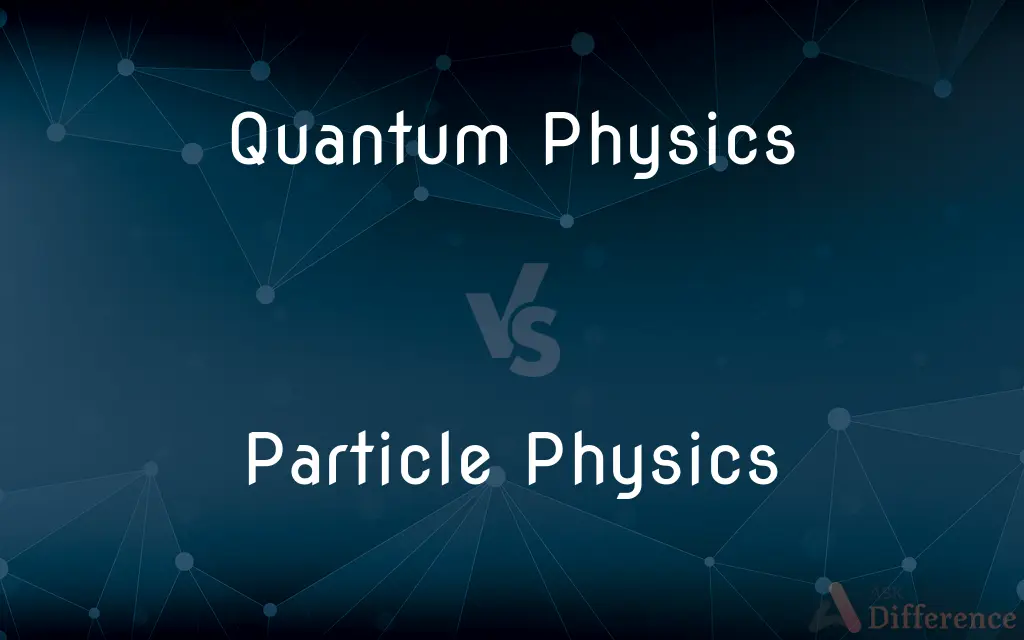Quantum Physics vs. Particle Physics — What's the Difference?
By Tayyaba Rehman — Published on November 17, 2023
Quantum Physics explores the behavior of matter and energy at the smallest scales, while Particle Physics studies particles that constitute matter and radiation.

Difference Between Quantum Physics and Particle Physics
Table of Contents
ADVERTISEMENT
Key Differences
Quantum Physics is the branch of physics that deals with the behavior of matter and energy at the most fundamental levels, specifically at the scale of atoms and subatomic particles. Particle Physics, however, focuses on studying these subatomic particles themselves, exploring their properties, interactions, and the forces acting upon them.
While Quantum Physics embraces a wide array of phenomena, including quantum entanglement, superposition, and tunneling, Particle Physics hones in on identifying and understanding particles, such as quarks, electrons, and photons, and their role in the universe. Quantum Physics incorporates the principles that govern the nature and behavior of matter and energy at that minuscule quantum level, providing the theoretical foundation from which Particle Physics can explore and validate through experimental methods.
An interesting divergence can be seen in the application and impact of Quantum Physics and Particle Physics in technology and our understanding of the universe. Quantum Physics has enabled the development of technologies like lasers, MRIs, and computers by utilizing the quantum nature of particles. Particle Physics, on the other hand, seeks to understand the fundamental particles and forces, thus enhancing our understanding of the universe from the big bang to the present.
Moreover, Quantum Physics employs mathematical frameworks, like wave functions and matrices, to describe phenomena that are often non-intuitive, such as particles existing in multiple states simultaneously. Particle Physics explores the realm of high-energy particles, utilizing powerful particle accelerators to observe and analyze particle interactions and transformations, unraveling the mysteries shrouding the fundamental components of matter.
Lastly, while both Quantum Physics and Particle Physics delve into the microscopic realm, they serve different yet interconnected purposes: Quantum Physics lays down the theoretical mechanisms of subatomic behavior, whereas Particle Physics seeks to apply those principles to understand the fabric of the universe, often through experimental processes.
ADVERTISEMENT
Comparison Chart
Primary Focus
Behavior and nature of matter and energy at quantum level
Study of fundamental particles and their interactions
Technological Impact
Enables technologies like lasers and computers
Involves technologies like particle accelerators
Theoretical Framework
Involves concepts like superposition and quantum entanglement
Concerns with particle interactions and classifications
Applications
Applied widely in varied technological and research fields
Primarily focused on fundamental physics research
Study Scale
Microscopic scale, focusing on atomic and subatomic realms
Investigates at a subatomic particle level
Compare with Definitions
Quantum Physics
Quantum Physics describes the quantum mechanical properties of particles.
Quantum Physics predicts the probabilistic nature of particle properties.
Particle Physics
Particle Physics investigates the forces acting upon subatomic particles.
Particle Physics studies include exploring the weak nuclear force.
Quantum Physics
Quantum Physics uses mathematical formulations to predict particle behavior.
Quantum Physics uses wave functions to describe electron positions.
Particle Physics
Particle Physics seeks to understand the fundamental elements of matter.
Particle Physics has uncovered particles that convey forces, such as the photon.
Quantum Physics
Quantum Physics investigates phenomena on an atomic and subatomic scale.
Quantum Physics explains the dual nature of light as both a particle and a wave.
Particle Physics
Particle Physics aims to explain the fundamental structure of the universe.
Particle Physics theories aim to unite gravitational and quantum forces.
Quantum Physics
Quantum Physics is foundational to understanding electromagnetic forces.
Quantum Physics describes how electrons move around the nucleus.
Particle Physics
Particle Physics employs particle accelerators for experimental purposes.
Particle Physics research at CERN explores particle interactions at high energies.
Quantum Physics
Quantum Physics encompasses the principles of superposition and entanglement.
Quantum Physics enables quantum computing through principles like superposition.
Particle Physics
Particle Physics delves into the study and interaction of subatomic particles.
Particle Physics explores entities like quarks and bosons.
Common Curiosities
How does Quantum Physics explain light?
Quantum Physics describes light as having a dual nature, behaving both as a particle (photon) and a wave, often interchangeably.
What is the core principle of Quantum Physics?
Quantum Physics fundamentally deals with the behavior of matter and energy at microscopic, especially atomic and subatomic, levels.
What is the focus of Particle Physics?
Particle Physics primarily involves the study of subatomic particles, their properties, and their interactions.
Is Quantum Mechanics different from Quantum Physics?
While used interchangeably, some suggest Quantum Mechanics specifically refers to the mathematical framework of quantum phenomena, while Quantum Physics is a broader term.
Why is the Higgs Boson significant in Particle Physics?
The Higgs Boson, discovered in 2012, validates the Higgs mechanism in Particle Physics, explaining how particles acquire mass by interacting with the Higgs field.
How does Quantum Entanglement work in Quantum Physics?
Quantum Entanglement involves two or more particles becoming correlated in such a way that the state of one instantly influences the state of the other, regardless of distance.
Can Quantum Physics predict exact outcomes?
Quantum Physics often predicts probabilities of outcomes rather than exact results, given the inherent uncertainty and superposition in quantum systems.
What particles are studied in Particle Physics?
Particle Physics explores fundamental particles like quarks, leptons, bosons, and their interactions through fundamental forces.
What role do observables play in Quantum Physics?
In Quantum Physics, observables, like position and momentum, are properties of a system that can be observed and measured, typically with inherent uncertainty.
Are Quantum Physics and Relativity compatible?
Quantum Physics and General Relativity currently lack a unified description, with efforts like string theory aiming to bridge the gap between them.
How does Particle Physics inform our understanding of the universe?
Particle Physics explores fundamental particles and forces, shedding light on the universe’s structure, interactions, and origin.
What are the fundamental forces studied in Particle Physics?
Particle Physics studies four fundamental forces: electromagnetism, gravity, and the weak and strong nuclear forces.
What are quarks in Particle Physics?
Quarks are elementary particles in Particle Physics, combining to form hadrons, like protons and neutrons, and interact through the strong force.
Does Quantum Physics adhere to classical logic?
Quantum Physics often defies classical logic, presenting phenomena like superposition, where particles can be in multiple states simultaneously.
How is Particle Physics relevant to the Big Bang Theory?
Particle Physics helps to explain conditions during the Big Bang and subsequent particle interactions, providing insights into the universe’s evolution.
Share Your Discovery

Previous Comparison
Sparsing vs. Parsing
Next Comparison
Bivariate Correlation vs. Partial CorrelationAuthor Spotlight
Written by
Tayyaba RehmanTayyaba Rehman is a distinguished writer, currently serving as a primary contributor to askdifference.com. As a researcher in semantics and etymology, Tayyaba's passion for the complexity of languages and their distinctions has found a perfect home on the platform. Tayyaba delves into the intricacies of language, distinguishing between commonly confused words and phrases, thereby providing clarity for readers worldwide.














































